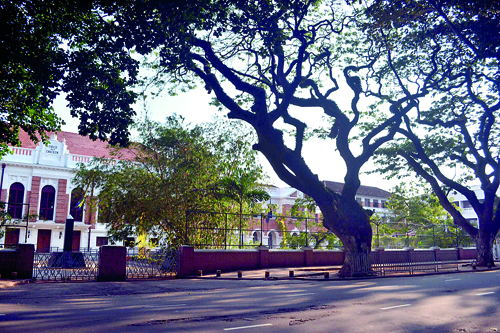It was the end of the 60s, when guys were too shy to say ‘beautiful’
Rising to pink heights of bloom on the school front lawn are the trees that blossom during the Big Match season. If, from early February, the flowering trees have been working up to an especially dazzling climax of pink blossoms during the week of the big match, in March, the school expects to see a good result on the cricket field. Abundant efflorescence means positive vibes in the air and a possibility of cricket victory.
It is March 1969. We are a mixed bunch of English Literature students, lolling around in the school hall, waiting for a teacher who does not always turn up. The English Teacher is also the Master In Charge of Cricket. His loyalties are equally divided between Shakespeare, Byron and Keats and the game that made W. G. Grace famous. During big match week, cricket is the priority. He will not turn up for classes.

The tree-lined avenue in front of Royal College, Colombo
We have the enormous assembly hall for our classroom, but sit in a small huddle of chairs arranged in a semi-circle by a side door opened to let in extra daylight. The minority Arts Stream has surrendered its single classroom to the majority Science Stream. Our class – a mix of 16- and 17-year-old Lower and Upper Six Arts students – is dominated by one tall and lanky Upper Sixth gentleman, who is the cricket captain that year, so as a minority group we tend to carry ourselves with a touch of panache.
Our chairs are turned so we can enjoy the view and the breeze that blows our way and increases the steady dripping of pink blooms. The flowers have been falling all month and they fall faster than the ground staff can sweep them away. They form a pink mat on the driveway running alongside the main school buildings. The pink does not stay pink for long. Cars, bicycles and marching students crush the colour out of the fallen flowers. What remains is a moist, messy, pinkish-brownish mash covering the asphalt.
As if the flowers have not been sufficiently smashed and discoloured, here comes a platoon of cadets in their khaki uniforms and crushing, crunching boots.
The cadets disappear around the corner, the sound of the sergeant’s voice and marching boots fades out, and the flowers keep sifting down.
“Beautiful,” murmurs a nerdish, bespectacled Lower Sixer, who quotes Victorian Poetry at the drop of a cap.
A hairy-chested Upper Sixer glares at the nerd. He is a member of the school rugby team. He is a soft-spoken, gentle bear. As a spokesman for the macho factor in schoolboy culture, he is obliged to rap the nerd for using a “sissy” word, one that real men and true-blue schoolboys do not use. At least, in 1969 they did not. When the Upper Sixer speaks, or rather growls, it is with authority; his father is a leading lawyer, his uncle a prominent politician.
The nerd twitches, embarrassed. He makes a mental note that “beautiful” is never to be used again, at least not on college premises. The word should be neither spoken nor written. Noted.
The cricket captain is indifferent to the conversation. His mind is on the week’s match, as it is on everyone’s mind that week.
The nerd remembers the Latin name for the flowers that leave pink trails in the air. The day before, the Latin Master had looked out of an upper floor window and, observing the arboreal extravaganza above the balcony, gave a short lecture on the flowers and chalked the words “TABEBUIA ROSEA” on the blackboard. The two words will stay in our memory, long after our vocabulary of scientific names has crumbled away.
When the Big Match arrives, the cricket captain and his team go out to bat, and the school wins.
That weekend, as if everyone knew there would be victory that year, there is a celebratory carnival on the school premises. The victory is like pink champagne, after the bitter flavour of two decades of drawn matches.
It is late in the evening, and the carnival is at its peak when the victorious team arrives. The music on the loudspeakers is deafening, and the crush of the crowd killing. The captain and his team are doing a victory round on the carnival ground. Their shirts and jackets smell of sweat, and there is beer on their breath. They are shaking hands and stopping to be hugged and kissed. The captain stops at the record request booth. As he and his team walk away, Engelbert Humperdinck calls after them, “You’re just too good to be true,” from the 1968 cover version of “Can’t Take My Eyes Off You.”
The trumpet-shaped tabebuia rosea blooms drip all evening and settle like candy floss on heads and shoulders, on families, on boyfriends and girlfriends, on schoolboys in casuals, school prefects in white uniform, on popcorn, hotdogs and ice-cream. The night is perfect. Beautiful.
It is four decades since that victory year, and in that time the human male has evolved as a social creature, along with the language he uses to express himself. He is not shy to say “beautiful” when he sees something that especially impresses him, whether it is a Harley Davidson racing along Galle Face Drive, a dazzling shot by Kumar Sangakkara, or a sunset over Hikkaduwa. It is the age of the metrosexual – the urban, urbane male who acknowledges his sensitive side and is not afraid to show it.
And that’s beautiful.



